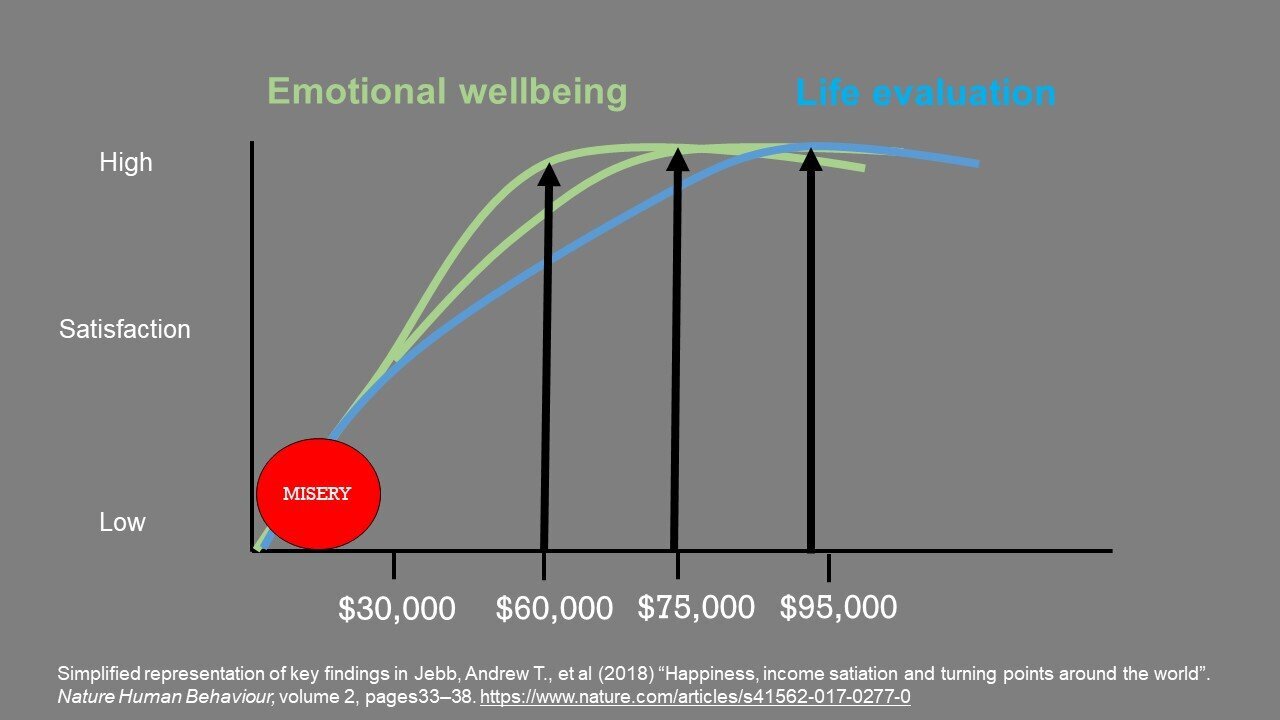How Would You Live If Money Was No Object?
Steve Thomson, 42, and his wife Lenka, 41, from West Sussex, won £105M on the Euro Lottery in November 2019. Source: PA Media/BBC
If you’re stressed about meeting the basic daily costs of living – food, housing and basic bills - you can feel mentally under siege. And that can make it almost impossible to make rational financial decisions, leading to you being trapped in a self-reinforcing poverty loop.
Some people have a strong character or experience some good luck, which enables them to escape grinding poverty, but many people don’t and so can’t. And when everyone else around you is skint, sad and depressed, it’s even harder to break that cycle. Money can alleviate the stress and sadness which comes from being skint and on that basis having enough money to avoid poverty is a worthy aim.
Does more money really make you happier?
Multi-millionaire financial gurus like Rob Moore and Ramit Sethi say that more money is always better than less, because the freedom, choice and control that a high surplus income and wealth offers can make you happy. They make lifestyle spending a virtue and something that you shouldn’t be ashamed or guilty of. They make the point that money needs to move around and buying goods and services for personal consumption is a good thing because it helps others achieve their desired lifestyle.
There has been a lot of research into the role that money plays in human happiness and one recent study suggests that you need a much higher level of income to be happy if you are comparing yourself to others (known as life satisfaction). However, the same research suggests that you need much less income to be happy with your yourself (known as emotional wellbeing). Other studies find that there is no limit to money’s ability to improve one’s overall happiness and wellbeing when it comes from comparing yourself to others.
Over the 25 years that I was a financial adviser I worked with many wealthy people (with a typical net worth of £5-50M). Most had accumulated their wealth through saving and/or building a business, but a minority had inherited their money.
In most cases my clients’ wealth enabled them to live a comfortable lifestyle and have more choice, variety and freedom to decide how they spend their time.
Wealthy people still have worries and problems
But no amount of wealth could stop them getting a serious illness, make it any easier to deal with the challenges of bringing up teenage children, or give them the self-discipline to take better care of their physical or mental health.
When my clients went on an exotic holiday, despite the change of environment and scenery, they still took their personal problems with them. And having no need to work for money sometimes caused them to lose a sense of purpose or meaningful emotional connections with other people.
Boredom sometimes led to mindless spending, endless travelling or harmful addictions.
In my experience wealthy people can still suffer anxiety, worry and stress. They might wonder whether people want to be their friend because they like them or because they like their money. They might be angry with the idea of paying 40% inheritance tax when they die and obsess about avoiding it. They might feel that they can’t trust anyone and become lonely, isolated and detached from normal people.
You’ve won the Euro Lottery
But let’s pretend for a moment that you have all the money you could ever need. The actual amount doesn’t matter, just pick a number that seems more than you think you’d reasonably need to live a life without worry and which would enable you to do whatever you want.
I want you to now imagine your new life. Where would you live, what would you do each day, and who would you hang out with? How would your personal relationships change? What activities would give you purpose and make you fulfilled? What activities and tasks would you delegate to others?
What experiences would you have? What role, if any, would working have in your life? Are there hobbies and past times that you’d indulge or iindulge more? Which people and causes would you help financially? Who will you leave your wealth to when your time is up?
If I had all the money I could ever need
Recently I did the ‘If I had all the money I could ever need’ exercise outlined earlier. I imagined that I’d won £100M on the Euro Lottery (As I don’t do the lottery this is never going to happen, but let’s go with it).
I thought first what I wouldn’t change.
I’d still take my dogs for a walk with my wife.
I’d still play the piano when I wanted to.
I’d still do my gym workouts, swimming and yoga.
I’d still read vociferously.
I’d still write and speak about financial wellbeing and I’d still help successful families prepare their heirs for their inheritance.
I’d still see my chums regularly for dinner.
I’d still meditate.
And I’d still drive my wife mad by forgetting where I left things!
Most of the things I currently do cost me nothing or very little and they make me happy. But there are still a lot of things that I intend to do in the coming years, most of which I can do with the resources I already have - mainly time, energy and knowledge.
But if money really was no object the following are the other things I might want to be, do or have:
Buy a Tesla Roadster - a stylish, environmentally friendly sports car for nipping to the gym.
Create an investment syndicate with other wealthy people, to provide early stage financial backing to hundreds of businesses that have the potential to have a high social impact and whose founders show strong potential - I love business and I like to see people build something that creates and delivers value.
Buy a mint condition Austin Healey Mark III BJ8 sports convertible - an iconic and less well-known British sports cars from the 1960s which is fun to drive.
Create a charitable foundation that provides boarding school education bursaries to children who are from disadvantaged backgrounds, particularly those susceptible to joining gangs – taking people out of a negative environment and away from bad people helps them form self-belief, positive attitudes and effective habits.
Buy a Bosendorfer Imperial Grand Piano (Model 290) - one of the best acoustic pianos in the world.
Give 25% of the annual income arising from the retained capital to Humanists UK; Shelter; WWF and Parkinson’s UK – all causes that mean a lot to me.
Buy several hectares of land with lots of old redundant agricultural buildings somewhere in northern England, and convert them into affordable offices, light industrial units and meeting spaces, as well as 50 or so low-density, sustainable residential housing for affordable rents – I like the idea of creating a community.
Create a personal development academy aimed at helping young people develop public speaking skills, personal confidence, and high self-esteem, with courses provided at subsidised or no cost – Helping young people to express themselves through effective communication is something I feel strongly about.
Buy a Jaguar E-Type Roadster Series 1 ½ or 2 in light blue – I’ve always loved this car since seeing it in the film The Italian Job when I was 8.
A 1967 Austin Healey 3000 Series III BJ8
Other than the indulgence of the cars and the piano, most of the things I’d do with an enormous sum of money relate to things that would help people help themselves to make the most of life. I do support those types of things now, but I’d just do them on a much larger scale if I had more money.
I know that, compared to many people, I’m financially comfortable. But I also know several people who earn more or who have accumulated more wealth than me. As I’ve got older, I’ve found that being less judgemental about and more empathetic towards people who are suffering hard financial times helps improve my own relationship with money. And appreciating what I do have, rather than what I don’t (compared to others) increases my overall happiness and life satisfaction.
Money can help you avoid the sadness and stress of being poor and it can help you enjoy life more by giving your greater choice, freedom and control. But if you look beyond your own needs, to something more meaningful and lasting than your own enjoyment, you’ll probably find even more happiness and fulfilment. Now that’s what I call leading a rich life!



